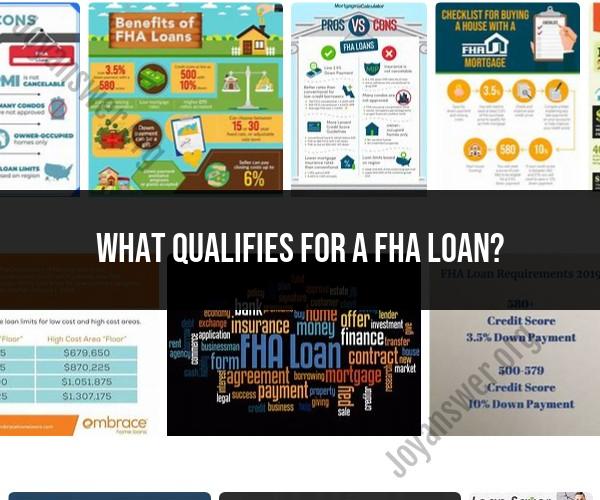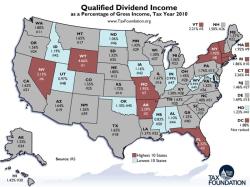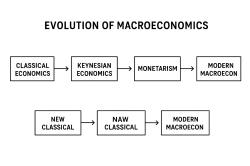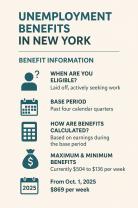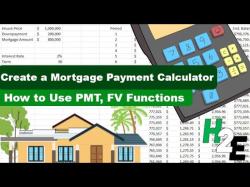What qualifies for a FHA loan?
To qualify for an FHA (Federal Housing Administration) loan, you need to meet certain eligibility requirements set by the FHA and the lender offering the loan. FHA loans are designed to make homeownership more accessible, particularly for first-time homebuyers and those with lower credit scores or smaller down payments. Here are the key qualifications for an FHA loan:
FHA Credit Score Requirements:
- Typically, a minimum credit score of 580 is required to qualify for the low down payment option (3.5% down).
- If your credit score is between 500 and 579, you may still qualify, but you will need a higher down payment of at least 10%.
Steady Employment and Income:
- Lenders will assess your employment history and income stability. You should have a consistent employment history or source of income for at least the past two years.
Debt-to-Income Ratio (DTI):
- Your debt-to-income ratio, which compares your monthly debt payments to your gross monthly income, should typically be below 43%.
- In some cases, lenders may consider higher DTI ratios, but compensating factors such as a larger down payment or strong credit history may be required.
Down Payment:
- FHA loans require a minimum down payment, typically 3.5% of the purchase price.
- Down payment funds can come from your savings, a gift from a family member, or an approved down payment assistance program.
Residency Status:
- You must be a legal resident of the United States and have a valid Social Security number to qualify for an FHA loan.
Property Requirements:
- The property you intend to purchase must meet certain minimum property standards set by the FHA, ensuring it's safe and habitable.
- It should be your primary residence, not an investment property or second home.
Mortgage Insurance Premium (MIP):
- FHA loans require both an upfront mortgage insurance premium (UFMIP) and an annual mortgage insurance premium (MIP).
- The UFMIP can be financed into the loan, but the MIP is an ongoing cost added to your monthly mortgage payment.
Bankruptcy and Foreclosure History:
- There are waiting periods after a bankruptcy or foreclosure before you can qualify for an FHA loan. The exact waiting period depends on the circumstances and the lender's policies.
FHA-Approved Lender:
- FHA loans are not directly issued by the FHA. You must work with an FHA-approved lender, such as a bank or mortgage company, to secure the loan.
Financial Responsibility:
- You should have a demonstrated history of financial responsibility and the ability to manage your debts.
Keep in mind that while the FHA sets these general eligibility guidelines, individual lenders may have their own additional requirements and may consider factors such as your credit history, employment stability, and overall financial situation. Therefore, it's essential to shop around and compare loan offers from multiple FHA-approved lenders to find the best fit for your specific circumstances.
What Makes You Eligible for an FHA Loan?
To be eligible for an FHA loan, you must meet the following basic requirements:
- Have a minimum FICO credit score of 580. If your credit score is between 500 and 579, you may still qualify for an FHA loan, but you will need to make a 10% down payment.
- Have a debt-to-income (DTI) ratio of no more than 43%. This means that your monthly mortgage payments, including principal, interest, property taxes, and insurance, should not exceed 43% of your gross monthly income.
- Make a down payment of at least 3.5% of the purchase price of the home.
In addition to these basic requirements, you must also meet the following criteria:
- The home must be your primary residence.
- The home must meet FHA minimum property standards.
- You must have a steady income and proof of employment.
FHA Loan Eligibility Factors: What Qualifies You for Approval?
The following are some of the key factors that FHA lenders will consider when evaluating your loan application:
- Credit score: Your credit score is one of the most important factors that lenders will consider. A higher credit score will make you more likely to qualify for a loan and get a better interest rate.
- Debt-to-income ratio: Your DTI ratio is another important factor that lenders will consider. A lower DTI ratio means that you have more income to cover your monthly mortgage payments.
- Down payment: The amount of your down payment will also affect your eligibility for an FHA loan. A higher down payment will reduce the amount of money you need to borrow and make you more likely to qualify for a loan.
- Employment history: Lenders will want to see that you have a steady income and are able to afford your monthly mortgage payments.
- Property type: FHA loans can be used to finance a variety of property types, including single-family homes, townhomes, condominiums, and multi-unit properties.
Decoding FHA Loan Qualifications: What to Look For
When you are reviewing your FHA loan qualifications, there are a few key things to look for:
- Credit score requirements: Make sure that your credit score meets the minimum requirements for an FHA loan.
- Debt-to-income ratio requirements: Calculate your DTI ratio to make sure that it is below the maximum threshold for an FHA loan.
- Down payment requirements: Determine how much you need to save for a down payment.
- Employment history requirements: Make sure that you have a steady income and are able to afford your monthly mortgage payments.
- Property type restrictions: Make sure that the property you want to buy is eligible for an FHA loan.
If you have any questions about your FHA loan eligibility, you should contact a qualified FHA lender. They can help you review your financial situation and determine if you qualify for an FHA loan.
